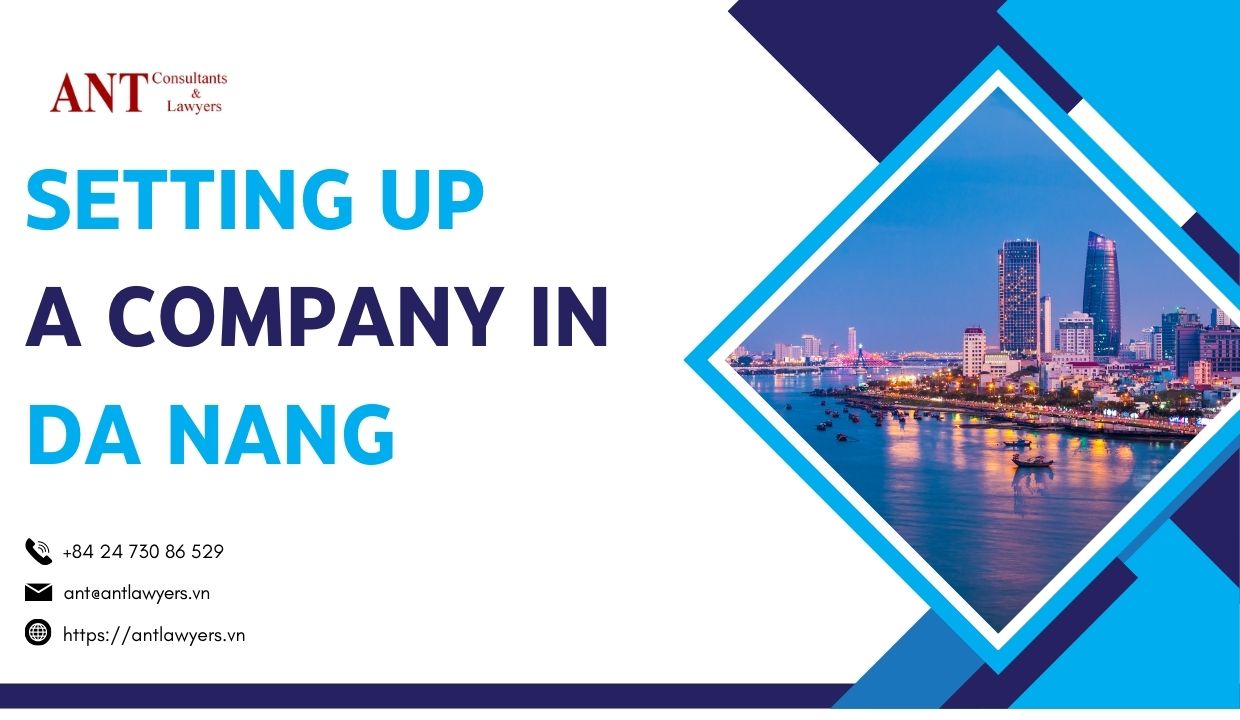Effortless Guide to Successfully Setting Up a Company in Da Nang: 10 Essential Steps for Foreign Investors


Setting_Up_a_Company_in_Da_Nang
Da Nang, Vietnam’s coastal , is rapidly becoming a preferred destination for foreign entrepreneurs and investors. Whether one seeks to expand a business, tap into a skilled yet cost-effective workforce, or enjoy a relaxed lifestyle while running a company remotely, Da Nang offers an abundance of opportunities. However, the journey of setting up a company in Da Nang requires a clear understanding of Vietnam’s regulatory framework, legal procedures, and compliance obligations. Foreign investors often face challenges related to investment conditions, minimum capital requirements, hiring local employees, and securing an office space. Navigating these complexities without professional assistance can be overwhelming, making it crucial to engage local English-speaking lawyers who can facilitate a seamless registration process.
Choosing the Right Business Structure
One of the first and most important steps in establishing a business in Da Nang is choosing the right company structure. Foreign investors have several options depending on their business needs and expansion goals. The most common and practical choice for many is the Limited Liability Company (LLC), which can be wholly foreign-owned and is relatively simple to manage. For larger enterprises that aim to raise capital through shareholders, the Joint Stock Company (JSC) is a suitable alternative.
Some foreign companies, particularly those interested in market research or liaison activities, may opt for a Representative Office (RO), which allows them to establish a presence in Vietnam without engaging in direct business operations. Although RO (different from company) is not a legal entity in Vietnam laws, it is worth mentioning for the purpose of simplicity and cost effective solutions in many cases which following procedures might not apply. Each business structure comes with its own set of regulations, and selecting the most suitable entity is a crucial decision that impacts the ease of doing business in Da Nang.
Applying for the Investment Registration Certificate (IRC)
Once the business structure is determined, foreign investors must apply for an Investment Registration Certificate (IRC) from the Da Nang Department of Planning and Investment (DPI). This certificate serves as official approval for foreign investment in Vietnam. The application process involves submitting a detailed business plan, proof of financial capability, and legal documents of the investor.
Some industries are subject to foreign ownership restrictions, and investment projects are assessed based on their contribution to the local economy. The processing time for an IRC typically ranges from fifteen to thirty working days. Delays often occur when applications are incomplete or when authorities require further clarification on the feasibility of the business. Seeking legal assistance during this stage can significantly expedite approval and prevent potential roadblocks.
Obtaining the Business Registration Certificate (BRC)
Following the issuance of the IRC, the next critical step is obtaining a Business Registration Certificate (BRC), which officially establishes the company as a legal entity in Vietnam. This registration requires the submission of various documents, including the company’s charter, the list of shareholders or members, and an application form in compliance with Vietnam’s Enterprise Law.
One of the key challenges at this stage is ensuring that the company name is unique and adheres to local regulations. Additionally, businesses operating in specific industries, such as food and education, may require additional licenses. The processing time for the BRC usually takes between five to ten working days. Engaging a lawyer to pre-check the company name and business scope can help streamline the process and avoid unnecessary rejections.
Registering the Company Seal and Tax Code
After securing the BRC, the company must proceed with administrative tasks such as registering a company seal and obtaining a tax identification number (TIN). These steps are essential for conducting business transactions and complying with Vietnamese tax regulations. Corporate taxes, including Value-Added Tax (VAT) and Corporate Income Tax (CIT), must be declared according to local laws. Tax compliance can be particularly complex for foreign-owned businesses, requiring accurate financial reporting and adherence to strict deadlines. Many foreign investors find it beneficial to hire an accountant or legal consultant who can handle tax filings and maintain compliance with Vietnamese financial regulations.
Opening a Corporate Bank Account
Opening a corporate bank account is another mandatory requirement for businesses operating in Da Nang. This process involves choosing a reputable Vietnamese bank, submitting the required documentation, and fulfilling compliance checks. Some banks may require the legal representative of the company to be present for account setup, adding an additional layer of procedural complexity. Without a business bank account, companies cannot process transactions, deposit capital contributions, or meet regulatory requirements. Working with a lawyer during this stage ensures that the process is handled efficiently and that investors select a bank that aligns with their business needs.
Contributing the Required Capital
Another crucial requirement for foreign-owned businesses in Vietnam is contributing the declared capital within ninety days of company registration. While there is no official minimum capital requirement for most industries, investors must declare a reasonable amount that reflects the operational needs of the company.
Certain industries, such as finance and real estate, may have higher capital requirements due to regulatory standards. Failure to contribute the capital within the designated timeframe can lead to penalties or even the revocation of the business license. Lawyers specializing in business law can provide strategic advice on capital structuring to ensure compliance while maintaining financial flexibility.
Securing an Office Space
Securing an office space is an essential part of establishing a business presence in Da Nang. Vietnamese law requires companies to have a registered business address, and the choice of office location depends on the nature of the business. Startups and technology firms may opt for virtual offices, while more established companies may require physical office space.
Industrial businesses, on the other hand, must operate from designated industrial zones. Leasing agreements must be legally notarized and registered with authorities to be valid. Some business activities may also require site inspections or additional approvals before commencing operations. Investors are advised to work with local legal professionals to ensure their lease agreements comply with Vietnamese real estate laws and regulatory requirements.
Hiring Local Employees and Work Permits
For those planning to hire local employees, compliance with Vietnamese labor laws is essential. Employers must draft proper labor contracts, register for social insurance contributions, and adhere to local employment regulations.
Hiring foreign employees adds another layer of complexity, as work permits and residency visas are required for non-Vietnamese workers. The process of obtaining a work permit for a foreign executive typically takes four to six weeks, and the employer must demonstrate that the foreign hire possesses expertise not readily available in the local labor market. Many investors find it beneficial to work with an HR consultant or legal advisor to navigate employment laws and ensure a smooth hiring process.
Obtaining Additional Business Licenses
Depending on the industry, additional business licenses may be required before operations can commence. For example, restaurants and food service businesses must obtain food safety permits, while educational institutions need an education license. Securing these permits involves compliance inspections and meeting industry-specific regulations. Overlooking licensing requirements can lead to operational delays or fines, making it crucial to verify all necessary permits before launching the business. Consulting a local legal expert can help ensure all regulatory obligations are met in a timely manner.
Ensuring Ongoing Compliance and Reporting
Once the company is fully operational, investors must focus on ongoing compliance and regulatory reporting. Businesses in Vietnam are required to submit annual financial statements, file tax declarations, and maintain updated employment records. Non-compliance with these requirements can result in severe penalties, including fines or suspension of business activities. Ensuring proper corporate governance and engaging professional legal or accounting services is highly recommended to maintain compliance with Vietnamese laws.
Conclusion
Setting up a company in Da Nang presents exciting opportunities, but it is a process that demands careful planning and a thorough understanding of regulatory requirements. Partnering with local English-speaking lawyers ensures that legal procedures are handled efficiently, investment conditions are optimized, and compliance risks are minimized.
About ANT Lawyers, a Law Firm in Vietnam
We help clients overcome cultural barriers and achieve their strategic and financial outcomes, while ensuring the best interest rate protection, risk mitigation and regulatory compliance. ANT lawyers has lawyers in Ho Chi Minh city, Hanoi, and Danang, and will help customers in doing business in Vietnam.
How ANT Lawyers Could Help Your Business?
You could reach ANT Lawyers in Danang for advice via email ant@antlawyers.vn or call our office at (+84) 24 730 86 529
Recent Posts
7 Bold Reasons Why Tokenization in Vietnam Could Transform Your Future
Change is coming. Quietly. Digitally. Rapidly. Let’s imagine the situation, which assets are no longer…
Vietnam P2P Lending: 5 Bold Reasons Why Decree 94/2025 Could Empower Millions or Backfire?
A New Financial Chapter Begins in Vietnam One person lends. Another borrows. It’s that simple.…
5 Essential Lessons from Risk Management in Digital Assets in Vietnam: Protecting Trust in a Digital World
Trust Is the Real Currency Money can be lost. Tokens can vanish. Platforms can crash.…
5 Powerful Reasons Why Vietnam Digital Asset Sandbox Is a Bold and Hopeful Move for Innovation
Change is fast. Rules are slow. But innovation can’t wait. As digital assets grow, so…
4 Critical Steps to Effectively Terminate The Employment Contracts with Confidence and Compassion
To terminate the employment contracts can be a complex and often sensitive process, especially when…
8 Insights from a Due Diligence Attorneys in Vietnam for Successful M&A Deals
Navigating the complex landscape of mergers and acquisitions (M&A) in Vietnam can be a daunting…




